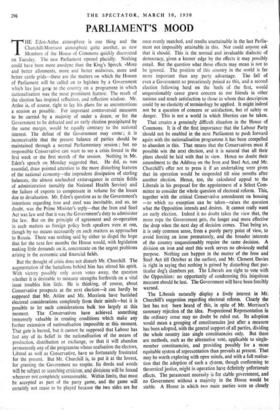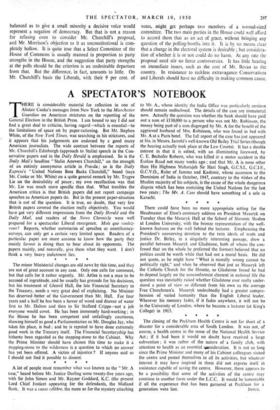PARLIAMENT'S MOOD
THE Eden-Attlee atmosphere is one thing and the Churchill-Morrison atmosphere quite another, as new Members of the House of Commons quickly discovered on Tuesday. The new Parliament opened placidly. Nothing could have been more anodyne than the King's Speech. 'More and better allotments, more and better midwives, more and better cattle grids—these are the matters on which the Houses of Parliament will be called on to legislate by a Government which has just gone to the country on a programme in which nationalisation was the most prominent feature. The result of the election has inspired reflection, and reflection wisdom. Mr. Attlee is, of course, right to lay his plans for as uncontentious a session as possible. For important controversial measures to be carried by a majority of under a dozen, or for the Government to be defeated and an early election precipitated by the same margin, would be equally contrary to the national interest. The defeat of the Government may come ; it is inconceivable that the present balance of parties should be maintained through a normal Parliamentary session ; but no responsible Conservative can want to see a crisis forced in the first week or the first month of the session. Nothing in Mr. Eden's speech on Monday suggested that. He- did, as was essential, draw pointed attention to the more disturbing features of the national economy—the imprudent dissipation of sterling balances, the almost unchecked extravagance in• certain fields of administration (notably the National Health Service) and the failure of exports to compensate in volume for the losses due to devaluation. Mr. Eden's question as to the Government's intentions regarding iron and steel was inevitable, and so, no doubt, was the Prime Minister's reply—that the Iron and Steel Act was law and that it was the Government's duty to administer the law. But on the principle of agreement and co-operation in such matters as foreign policy both speakers were at one, though by no means necessarily on such matters as approaches to Russia. There was nothing said by either to dispel the hope that for the next few months the House would, with legislation making little demands on it, concentrate on the urgent problems arising in the economic and financial fields.
But the thought of crisis does not disturb Mr. Churchill The augmentation of the battalions behind him has stirred his spirit. With victory possibly only seven votes away, the question whether it is desirable to measure strengths forthwith on a vital issue troubles him little. He is thinking, of course, about Conservative prospects at the next election—it can hardly be supposed that Mr. Attlee and Mr. Morrison have banished electoral considerations completely from their minds—but it is possible to let such considerations bulk too largely at this moment. The Conservatives have achieved something immensely valuable in creating conditions which make any further extension of nationalisation impossible at this moment. That gate is barred, but it cannot be supposed that Labour has lost any of its belief in the nationalisation of the means of production, distribution or exchange, or that it will abandon permanently any of the programme whose realisation the electors, Liberal as well as Conservative, have so fortunately frustrated for the present. But Mr. Churchill is, to put it at the lowest, for granting the Government no respite. Its deeds and words will be subject to searching criticism, and divisions will be forced wherever not completely unreasonable. Within limits, that must be accepted as part of the party game, and the game will certainly not cease to be played because the two sides are for once evenly matched, and results unattainable in the last Parlia- ment not impossibly attainable in this. Nor could anyone ask that it should. This is the normal and invaluable dialectic of democracy, given a keener edge by the effects it may possibly entail. But the question what those effects may mean is not to be ignored. The position of this country in the world is far more important than any party advantage. The fall of even a Government so.precariously poised as this, and a second election following hard on the heels of the first, would unquestionably cause grave concern to our friends in other nations and much satisfaction to those to whom that description could by no elasticity of terminology be applied. It might indeed not be a question of concern or satisfaction, but of safety or danger. This is not a world in which liberties can be taken.
That creates a genuinely difficult situation in the House of Commons. It is of the first importance that the Labour Party 'should not be enabled in the next Parliament to push forward again with the nationalisation programme it has been compelled to abandon in this. That means that the Conservatives must if possible win the next election, and it is natural that all their plans should be laid with that in view. Hence no doubt their amendment to the Address on the Iron and Steel Act, and Mr. Churchill's offer not to press it if an undertaking were given that its operation would be suspended till nine months after another election. Hence, too, the calculated appeal to the Liberals in his proposal for the appointment of a Select Com- mittee to consider the whole question of electoral reform. This, together with the critical Conservative amendment on housing —to which no exception can be taken—raises the question what the Opposition intends and desires. It cannot really want an early election. Indeed it no doubt takes the view that, the more rope the Government gets, the longer and more effective the drop when the next day of decision comes. That being so, it is only common sense, from a purely party point of view, to avoid forcing an issue prematurely, and the broader interests of the country unquestionably require the same decision. A division on iron and steel this week serves no obviously useful purpose. Nothing can happen in the matter of the Iron and Steel Act till October at the earliest, and Mr. Clement_ Davies is right in saying that nothing is gained by disturbing that par- ticular dog's slumbers. yet. The Liberals are right to vote with the Opposition: no opportunity of condemning this iniquitous measure should be lost. The Government will have been forcibly warned.
The Liberals naturally display a lively interest in Mr. Churchill's suggestion regarding electoral reform. Clearly the last has not been heard of this, in spite of Mr. Morrison's summary rejection of the idea. Proportional Representation in the ordinary sense may no doubt be ruled out. Its adoption would mean a grouping of constituencies just after a measure has been adopted, with the general support of all parties, dividing the whole country into single constituencies only. But there are methods, such as the alternative vote, applicable to single- member constituencies, and providing possibly for a more equitable system of representation than prevails at present. That may be worth exploring with open minds, and with a full realisa- tion that the adoption of such a system, though conforming to theoretical justice, might in operation have definitely unfortunate effects. The paramount necessity is for stable government, and no Government without a majority in the House would be stable. A House in which two main parties were so closely balanced as to give a small minority a decisive voice would represent a negation of democracy. But that is not a reason for refusing even to consider Mr. Churchill's proposal, and Mr. Morrison's objection to it as unconstitutional is com- pletely hollow. It is quite true that a Select Committee of the House of Commons is usually manned in proportion to party strengths in the House, and the suggestion that party strengths at the polls should be the criterion is an undesirable departure from that. But the difference, in fact, amounts to little. On Mr. Churchill's basis the Liberals, with their 9 per cent. of votes, might get perhaps two members of a normal-sized committee. The two main parties in the House could well afford to accord them that as an act of grace, without bringing any question of the polling-booths into it. It is by no means clear that a change in the electoral system is desirable ; but considera- tion of whether it is or not could do no harm. At any rate the proposal need stir no fierce controversies. It has little bearing on immediate issues, such as the cost of Mr. Bevan to the country. In resistance to reckless extravagance Conservatives and Liberals should have no difficulty in making common cause.



































 Previous page
Previous page